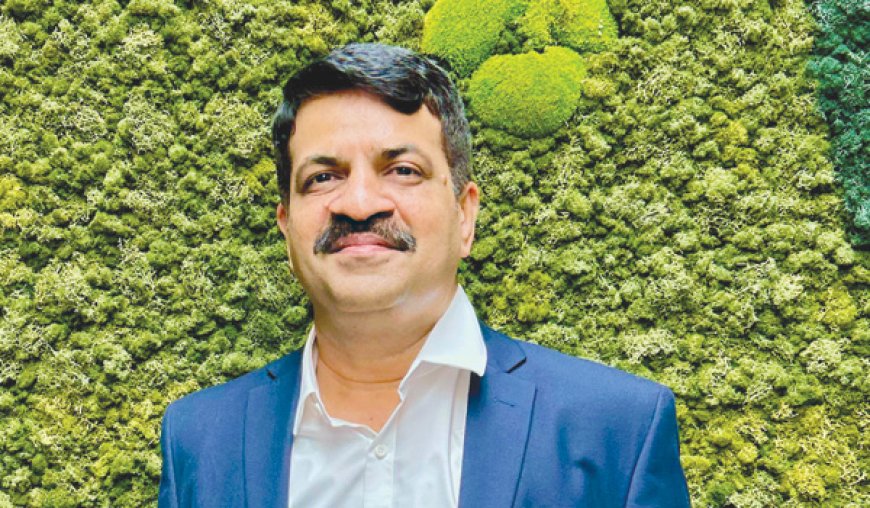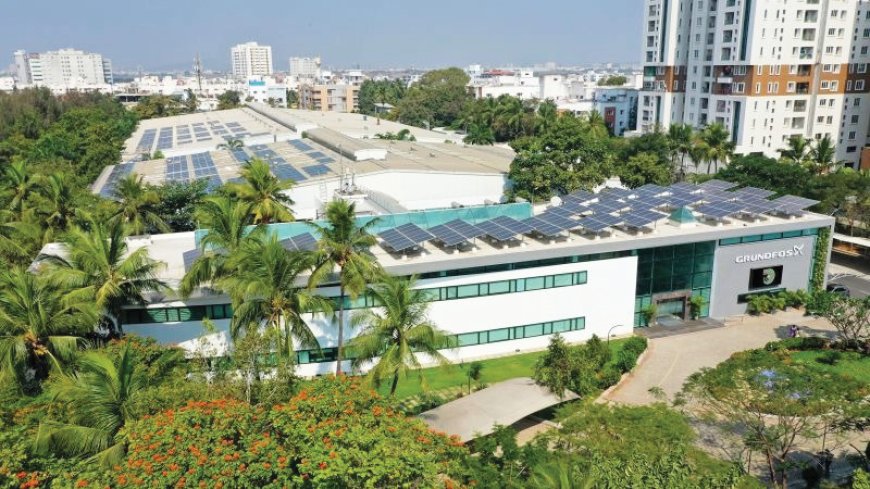We seek to remain a partner of choice for governments in India as well as other countries.
Water infrastructure encompasses a range of critical dimensions such as supply, treatment, and management. India has shown tremendous growth in the vast water infrastructure space, thanks to efforts by government, private players and the voluntary sector.

Raveendra Bhat
Area Sales Director, Water Utility INDO Region, Grundfos
How do you assess India’s water infrastructure growth and ongoing developments?
Water infrastructure encompasses a range of critical dimensions such as supply, treatment, and management. India has shown tremendous growth in the vast water infrastructure space, thanks to efforts by government, private players and the voluntary sector. Flagship schemes of the Government of India such as the Jal Jeevan Mission have had tremendous impact. The Atal Bhujan Yojana and the Namami Gange programme have also revamped the groundwater management and Sewage Treatment Plant (STP) infrastructure, respectively by addressing specific needs in water-stressed geographies. The Budget 2024 has also recognised energy security as a priority area. These efforts have not only brought the focus on the need for robust water infrastructure but also encouraged private players to partner with government. Private players must hence continue to help consolidate India’s water story.
How is the company playing a major role in India’s water recycling and sustainability?
India is an important market for us. Grundfos is leading the way for businesses in India by responsibly managing its own water withdrawal, reducing energy consumption and creating a green supply chain for all its activities.
Our water recycling initiatives in key regions include:
Chennai: The 14,800-sq ft factory has underground water tanks with a capacity of 350,000 l for rainwater harvesting. All wastewater from the factory is being recycled for landscaping and gardening, making it a Zero Liquid Discharge facility. The factory-office is LEED certified from the US Green Building Council.
Grundfos had also partnered with Cognizant and Nature Conservancy to restore the 100-acre Sembakkam lake. The project will help build a wastewater treatment system, improve the lake’s storage capacity by 50% and enhance groundwater recharge.
Navi Mumbai: Grundfos has played a key role in managing floods and impacting urban rejuvenation in India. Efforts to manage the wastewater in Navi Mumbai through prefabricated pumping system technology (PUST) is a case in point. Post installation, the sewage water was pumped to the nearest STP, this resulted in positive ecological outcomes where the return of migratory birds was noticed and had an increase in the number of settlements near the lake.
Karnataka: Grundfos has undertaken CSR projects to augment water resources through innovative rainwater harvesting techniques. This has benefitted small farm holders in Karnataka.
Aquifer management over geographies: We at Grundfos recognise the vital role aquifers play in sustaining ecosystems. We have replicated models from other markets to ensure aquifer management in India is community-centric and sustainable.
Sustainability is an integral part of our business. Grundfos has integrated life cycle thinking and eco-design principles into product development and innovation. Our sustainability ambitions focus on areas where we can make the greatest impact: saving water, saving energy, improving water access and developing a circular business. Grundfos has also received a platinum medal from EcoVadis for its business sustainability efforts.

Which are your landmark projects and technologies for the water sector?
At Grundfos, we create intelligent and sustainable pumping solutions for operations across industries.
- Our smart sensor product Grundfos Metasphere works to prevent spills and overflows by detecting rising wastewater levels and sending real-time electronic alerts.
- Grundfos iSolutions Cloud (for wastewater networks) and Grundfos MLE Motor Series are our cloud-based solutions.
- Our smart pumps also integrate well with Building Management Systems to optimise operations and positively impact the water and energy chains in construction settings.
- We have implemented highly optimised Solar Water Solutions to match a range of applications from low-flow to large-scale. These are used on farms, ranches, and homes.
Landmark projects in the water technology sector
Grundfos and transnational partnerships: Grundfos has inked a Strategic Green Partnership with Denmark to further collaboration on green and water projects.
Grundfos has collaborated on various projects with the Government of India through the Jal Jeevan Mission to overcome rising demand-supply gaps in water.
Grundfos India and impact through CSR: Grundfos has helped install 36 solar pumping stations in the Kashmir Valley – this initiative has ensured uninterrupted water supply to 50,000 residents. We have also helped restore the Injambakkam pond in Chennai.
These partnerships reflect the Grundfos belief that by advancing the flow of water, we are advancing the flow of life.
How do you look forward to the emerging opportunities in Indian water infra sector?
The water infra space in India is rife with opportunity. Multiple industries such as construction, power and refineries rely on water technologies. The numbers support this demand – the Indian water & waste water treatment market is expected to grow from $1.31 billion in 2020 to $2.08 billion by 2025. India’s demand for water is also projected to double current supply by 2030. Private players must hence capitalize on B2B opportunities and also partner with government to address the country’s water needs. Innovation, testing and R&D will, no doubt, enrich the environment for the growth of the water technology sector. Other trends such as Cloud and AI are also setting the stage for enhanced water governance by various players. We are cognizant of these opportunities.
What is your Mission 2025 for the company?
Grundfos has built significant partnerships with governments at the national, state and municipal levels. Throughout 2025 and beyond, we seek to remain a partner of choice for governments in India as well as other countries and help shape the water landscape across geographies. We also strive to exhibit continued commitment to the Sustainable Development Goals of the United Nations through our business operations, transnational partnerships, CSR programmes and advocacy efforts. From a sustainability perspective, the DNA of our business and brand will continue to leave a lasting imprint on the water and renewable space.







